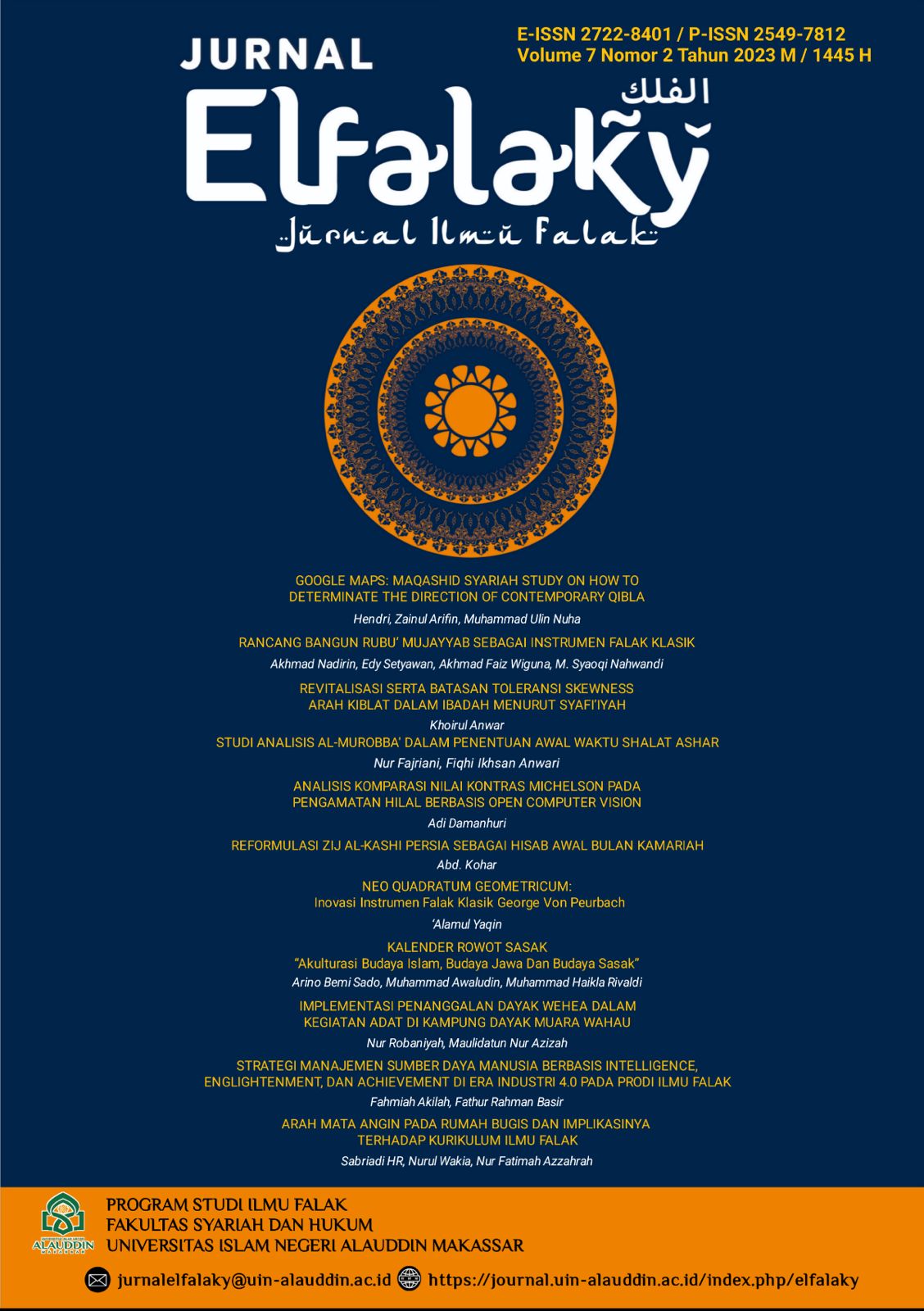KALENDER ROWOT SASAK
Abstract
Indonesia, has two calendars that have been strongly attached to the way of life in its society. These are the Gregorian calendar and the Hijri calendar. In addition, each region of Indonesia also has its own traditional calendar system. One type of traditional calendar that is still alive today is the Rowot Sasak Calendar. The Rowot Sasak Calendar uses the Moon as the base for its calculation system, so it is very similar to the Hijriyah system. But as a traditional calendar, the cultural components in it are very similar to the Islamic Javanese Calendar. So the author is interested in further research on the existence of cultural acculturation between Islam, Java and Sasak in the Rowot Sasak Calendar. This research uses qualitative methodology with field study research type and descriptive qualitative analysis. The findings of this study indicate that there is a strong acculturation between the three cultures in the rowot sasak calendar. The acculturation is based on the system that uses the Islamic calendar (Hijriyah) urfi hisab system. This is proven by the names of the months that adopt from the Hijriyah calendar, as well as the number of days 29/30 each month. Meanwhile, the Javanese cultural element can be identified in the component of determining good days for the community. In addition, the use of market names such as kliwon, wage, pahing, pon and legi is strong evidence of Javanese cultural acculturation. While the elements of Sasak culture itself can be found in the mention of the name of the day and other cultural terms that use terms in the Sasak language. As well as the determination of mangse (season) which uses the 5-15-25 tradition benchmark with synchronization on the Hijriyah calendar.
References
Ari Irawan, Lalu. dkk., 2014. Mengenal Kalender Rowot Sasak, Mataram: Genius.
Awaludin, Muhammad. “Kalender Rowot Sasak (Kalender Tradisi Masyarakat Sasak),” AL-AFAQ Jurnal Ilmu Falak Dan Astronomi Fakultas Syariah Universitas Islam Negeri (UIN) Mataram 1, no. 1 (2019).
Awaludin, Muhammad. 2020. Astronomi Tradisi (Membaca Kalender Rowot Sasak) (Mataram: UIN Mataram Press.
Azhari, Susiknan. 2007. Ilmu Falak, Perjumpaan Khazanah Islam dan Sains Modern, Yogyakarta: Suara Muhammadiyah.
Azhari, Susiknan. Catatan dan Koleksi Astronomi Islam dan Seni, Jalan Menyingkap Keagungan Ilahi, Yogyakarta: Museum Astronomi Islam.
Basarudin, “Sejarah Perkembangan Islam Di Pulau Lombok Pada Abad Ke-17,” SANGKéP: Jurnal Kajian Sosial Keagamaan 2, no. 1 SE-Articles (July 18, 2019): 31–44, https://doi.org/10.20414/sangkep.v2i1.933.
Darsono, Ruswa. 2010. Penanggalan Islam, Tinjauan Sistem, Fiqh dan Hisab Penanggalan. Yogyakarta: Labda Press.
Hambali, Slamet. 2011. Almanak Sepanjang Masa. Semarang: Program Pascasarjana IAIN Walisongo Semarang.
Hidayah, Zulyani. 2015. Ensiklopedi Suku Bangsa Di Dindonesia, Jakarta: yayasan Pustaka Obor Indonesia.
Izzuddin, Ahmad. 2015. Sistem Penanggalan. Semarang: Karya Abadi Jaya.
Khazin, Muhyiddin. 2005. Kamus Ilmu Falak, Yogyakarta: Buana Pustaka.
Khazin, Muhyiddin. 2008. Ilmu Falak dalam Teori dan Praktik, Yogyakarta: Buana Pustaka.
Maesyaroh, Kalender Hijriyah Global Turki Upaya Mewujudkan Kepastian Transaksi Ekonomi Pada Lembaga Keuangan Syari’ah, Jurnal Al-Hikmah, Volume, 3 Nomor, 1, Januari 2017.
Masruhan, Pengaruh Islam Terhadap Kalender Masyarakat Jawa, Al-Mizan, Jurnal Pemikiran Hukum Islam, Volume 13, Nomor 1, Tahun 2017.
Muhammad Sholehuddin dan Siti Tatmainul Qulub, Analisis Kesesuaian Kalender Jawa Islam dengan Kalender Hijriyah, Al-Afaq, Jurnal Ilmu Falak dan Astronomi, Volume 4 Nomor 1 Tahun 2022.
Sholikin, Muhammad. 2010. Misteri Suro Perspektif Islam Jawa. Yogyakarta: Penerbit Narasi.
Susiknan Azhari dan Ibnor Azli Ibrohim, Kalender Jawa Islam: Memadukan Tradisi dan Tuntutan Syar'i, Jurnal Asy0Syir’ah, Volume 42 Nomor 1 tahun 2008.
Tim Penyusun Kamus Pusat Bahasa, 2008. Kamus Besar Bahasa Indonesia, (Jakarta: Pusat Bahasa Depaartemen Pendidikan Nasional.
Umar Al-Jailani, Zubair. t.th. Al-Khulashah al-Wafiyah, Kudus, Menara Kudus.
Wawancara dengan KH Slamet hambali Semarang Via WhatsApp padahari Ahad, tanggal 9 Oktober 2022.
Wawancara Kiyai Ratna, pada hari Jum’at, tanggal 2 September 2022 di desa Kidang, Kec. Praya Timur, Lombok Tengah.
Wawancara Mamiq Tuan Agus (Budayawan dan Ketua Pembina Rowot) pada hari Sabtu, 10 September 2022, di Bencingah, Jl. Gili Air No. 12, Taman Sari Ampenan, Mataram.





